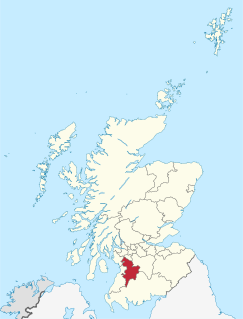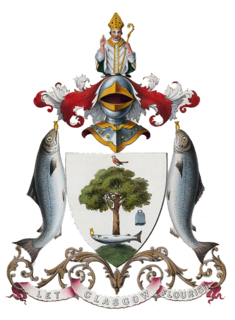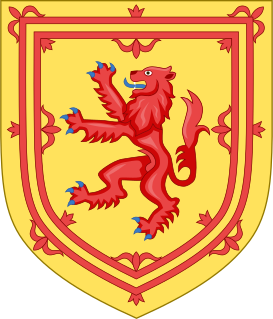
East Ayrshire is one of thirty-two council areas of Scotland. It shares borders with Dumfries and Galloway, East Renfrewshire, North Ayrshire, South Ayrshire and South Lanarkshire. The headquarters of the council are located on London Road, Kilmarnock. With South Ayrshire and the mainland areas of North Ayrshire, it formed the former county of Ayrshire.

East Dunbartonshire is one of the 32 council areas of Scotland. It borders the north of Glasgow and contains many of the affluent areas to the north of the city, including Bearsden, Milngavie, Balmore and Torrance, as well as many of the city's commuter towns and villages. East Dunbartonshire also shares borders with North Lanarkshire, Stirling and West Dunbartonshire. The council area covers parts of the historic counties of Dunbartonshire, Lanarkshire and Stirlingshire.

Glasgow City Council is the local government authority for the City of Glasgow, Scotland. It was created in 1996 under the Local Government etc. (Scotland) Act 1994, largely with the boundaries of the post-1975 City of Glasgow district of the Strathclyde region.

Local government in Scotland comprises thirty-two local authorities, commonly referred to as Scottish councils. Each council provides public services, including education, social care, waste management, libraries and planning. Councils receive the majority of their funding from the Scottish Government, but operate independently and are accountable to their local electorates. Councils raise additional income via the Council Tax, a locally variable domestic property tax, and Business rates, a non-domestic property tax.
A councillor is a member of a local government council in some countries.

A burgh is an autonomous municipal corporation in Scotland and Northern England, usually a city, town, or toun in Scots. This type of administrative division existed from the 12th century, when King David I created the first royal burghs. Burgh status was broadly analogous to borough status, found in the rest of the United Kingdom. Following local government reorganisation in 1975, the title of "royal burgh" remains in use in many towns, but now has little more than ceremonial value.
The Local Government etc. (Scotland) Act 1994 is an Act of the Parliament of the United Kingdom which created the current local government structure of 32 unitary authorities covering the whole of Scotland.

Skye and Lochalsh is one of eight former local government districts of the two-tier Highland region of Scotland. The main offices of the Skye and Lochalsh district council were in Portree, on the Isle of Skye.
A town council, city council or municipal council is a form of local government for small municipalities.
A county council is the elected administrative body governing an area known as a county. This term has slightly different meanings in different countries.

Municipal boroughs were a type of local government district which existed in England and Wales between 1835 and 1974, in Northern Ireland from 1840 to 1973 and in the Republic of Ireland from 1840 to 2002. Broadly similar structures existed in Scotland from 1833 to 1975 with the reform of royal burghs and creation of police burghs.

A lord provost is the convenor of the local authority, the civic head and the lord-lieutenant of one of the principal cities of Scotland. The office is similar to that of a lord mayor. Only the cities of Aberdeen, Dundee, Edinburgh and Glasgow have a lord provost; other Scottish local authorities have provosts or convenors, which are similar offices to that of a mayor. Perth previously termed its civil leader a "lord provost", but from the Second World War onwards has preferred the simple term Provost of Perth.
A community council is a public representative body in Great Britain.
A bailie or baillie is a civic officer in the local government of Scotland. The position arose in the burghs, where bailies formerly held a post similar to that of an alderman or magistrate. Baillies appointed the high constables in Edinburgh, Leith and Perth. Modern bailies exist in Scottish local councils, with the position being a courtesy title and appointees often requested to provide support to the lord provost or provost - the ceremonial and civic head of the council - in their various engagements.
A police burgh was a Scottish burgh which had adopted a "police system" for governing the town. They existed from 1833 to 1975.
A prévôt was a governmental position of varying importance in Ancien Régime France, typically referring to a civil officer, magistrate, head of cathedral or church, often anglicised as provost. A unit of justice or court overseen by a prévôt was known as a prévôté.
Local government areas covering the whole of Scotland were first defined by the Local Government (Scotland) Act 1889. As currently defined, they are a result, for the most part, of the Local Government etc (Scotland) Act 1994.

The City of Edinburgh Council is the local government authority for the City of Edinburgh. It was created in 1996 under the Local Government etc. (Scotland) Act 1994, with the boundaries of the post-1975 City of Edinburgh District Council of the Lothian region.
Elections to East Dunbartonshire Council were held on Thursday 4 May, the same day as the 31 other local authorities in Scotland. The election used seven wards created under the Local Governance (Scotland) Act 2004, a reduction of one from 2012, with 22 Councillors being elected, 2 fewer overall. Each ward elected either 3 or 4 members, using the STV electoral system.








